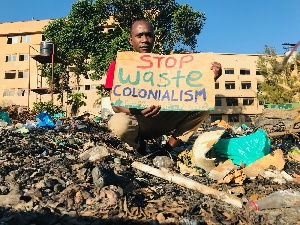- Home - News
- Elections 2024
- News Archive
- Crime & Punishment
- Politics
- Regional
- Editorial
- Health
- Ghanaians Abroad
- Tabloid
- Africa
- Religion
- Photo Archives
- Press Release
General News of Tuesday, 1 April 2025
Source: www.ghanawebbers.com
Global fashion waste crisis: Africa calls for end to 'waste colonialism'
As the world observes the International Day of Zero Waste 2025, urgent action is needed. Environmental groups Global Alliance for Incinerator Alternatives (GAIA) Africa and Green Africa Youth Organisation (GAYO) are leading this call. They focus on the unchecked dumping of textile waste in Africa.
This year’s theme is "Towards Zero Waste in Fashion and Textiles." It highlights the severe impact of fast fashion on the environment, especially in developing countries.
The global fashion industry generates about 92 million tonnes of textile waste each year. A large portion ends up in African markets as second-hand clothing donations. Ghana’s Kantamanto Market receives around 15 million used clothing items weekly, mostly from the Global North. Unfortunately, much of this clothing is unsellable due to poor quality, leading to dumping in landfills and illegal sites.
Jacob Johnson Attakpah from GAYO warns that Africa is overwhelmed by textile waste. He states, “Africa refuses to be at the receiving end of textile waste from the West.” He calls for circular design, responsible sourcing, and innovative recycling to achieve true zero waste.
The textile waste crisis has serious consequences beyond environmental damage. In cities like Accra, discarded clothes clog drainage systems and worsen flooding. Coastal areas are polluted with heaps of abandoned garments instead of seashells. The Agbogbloshie Market has become a dumping ground for unsellable clothing.
Additionally, the influx of second-hand clothing harms Africa’s local textile industry. Cheap imports reduce demand for locally produced fabrics, pushing many artisans out of business.
Developed nations dominate the trade of second-hand textiles. In 2023, top exporters included:
- United States: $1.06 billion
- China: $681 million
- Germany: $338 million
- United Kingdom: $327 million
Many exported clothes create unmanageable waste problems in African countries. Nirere Sadrach from End Plastic Pollution (EPP) criticizes this as "waste colonialism." He says some Global North countries use second-hand trade to export their waste to poorer nations.
GAIA Africa and its partners demand immediate policy changes to address fast fashion's environmental harm. Their key demands include:
1. **Ban on Unmanageable Textile Waste Dumping** - African governments should prohibit importing non-reusable or non-recyclable second-hand clothing.
2. **Extended Producer Responsibility (EPR)** - Fashion brands must be accountable for their generated waste and implement sustainable solutions.
3. **Investment in Local Textile Industries** - Policies should support sustainable growth in Africa’s textile sector.
4. **Consumer Awareness and Action** - Encouraging sustainable fashion choices can help reduce fast fashion demand.
Desmond Alugnoa from GAIA Africa emphasizes that “Africa cannot become a dumping ground for fast fashion’s waste.” He insists that urgent policies are needed to stop exporting unmanageable textile waste and hold corporations accountable.
Some organizations are working on new solutions for Accra's textile waste problem. They transform discarded materials into sustainable products like laptop stands and speaker shells.
As we mark the International Day of Zero Waste, African nations and environmental groups stand against harmful fast fashion practices. With increasing textile waste threatening ecosystems and communities, systemic change is urgently needed. The fight against "waste colonialism" is a global responsibility that affects us all.











